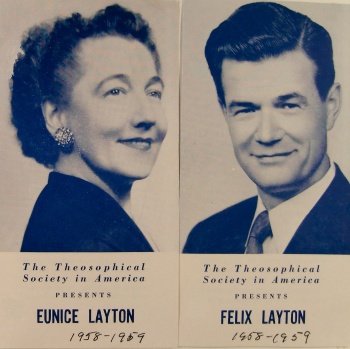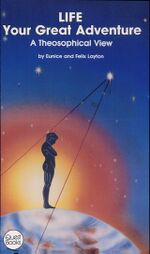Felix Layton: Difference between revisions
No edit summary |
|||
| Line 6: | Line 6: | ||
[[File:Laytons flier 1958.jpg|350px|right|thumb|Publicity leaflet for a lecture tour, 1958. Image from TSA Archives.]] | [[File:Laytons flier 1958.jpg|350px|right|thumb|Publicity leaflet for a lecture tour, 1958. Image from TSA Archives.]] | ||
'''Felix Layton''' was a lecturer and educator who was active in the [[Theosophical Society in America]]. He often toured with his wife [[Eunice Layton|Eunice]] | '''Felix Layton''' was a lecturer and educator who was active in the [[Theosophical Society in America]]. He often toured with his wife [[Eunice Layton|Eunice]]. | ||
== Early years == | == Early years == | ||
Felix Layton was born on [[September 10]], 1910. | |||
On March 17, 1952, he became a naturalized citizen of the United States. | |||
== Theosophical Society work == | == Theosophical Society work == | ||
| Line 21: | Line 23: | ||
Laytons retired from lecturing to live in San Francisco. Over 50 members of California lodges united to hold a welcome party at the home of Mr. and Mrs. George Barthholemew.<ref>"New and Notes: Welcome to the Laytons," ''The American Theosophist'' 60.10 (October, 1972), 273.</ref> | Laytons retired from lecturing to live in San Francisco. Over 50 members of California lodges united to hold a welcome party at the home of Mr. and Mrs. George Barthholemew.<ref>"New and Notes: Welcome to the Laytons," ''The American Theosophist'' 60.10 (October, 1972), 273.</ref> | ||
Mr. Layton died on [[September 21]], 1991. | |||
According to an article written in 1991, | According to an article written in 1991, | ||
Revision as of 19:53, 19 January 2024
ARTICLE UNDER CONSTRUCTION
ARTICLE UNDER CONSTRUCTION
Felix Layton was a lecturer and educator who was active in the Theosophical Society in America. He often toured with his wife Eunice.
Early years
Felix Layton was born on September 10, 1910.
On March 17, 1952, he became a naturalized citizen of the United States.
Theosophical Society work
Liberal Catholic Church
Freemasonry
Later years
Laytons retired from lecturing to live in San Francisco. Over 50 members of California lodges united to hold a welcome party at the home of Mr. and Mrs. George Barthholemew.[1]
Mr. Layton died on September 21, 1991.
According to an article written in 1991,
On September 21, at 1 a.m., Felix Layton passed away in Ojai, California, after a brief illness. Mr. Layton had been vice-president and resident head of Krotona Institute of Theosophy since 1986. He had served the Theosophical Society in many capacities during his lifetime, and was known and loved by members throughout the world.
Felix was born September 10, 1910 and raised in a theosophical family in England. Responding to a request from International President George Arundale for workers, as a young man he sailed for India. He spent seven years in Adyar teaching (Radha Burnier was one of his students) and later as headmaster of the Besant School.
He then returned to the U.S. and taught science in high schools in the San Francisco area for several years. He soon found himself working full time for the Society again, and for the next 20 years, he and his wife, Eunice, traveled and lectured throughout the U.S. and around the world. As part of the American Section’s regional expansion program, they spoke to both public and theosophical audiences. During this time they returned to Adyar to direct the School of the Wisdom. Felix served as national vice-president of the American Section from 1966 to 1972. The Laytons came to Krotona in 1977 and were co-directors of the Krotona School for three years. In 1986 he was appointed resident head of the Krotona Institute by Radha Burnier.
The Laytons’ public talks have been compiled in the Quest book, Life, Your Great Adventure.
Felix was a 32nd degree Co-Mason, American Federation of Human Rights, and was also a priest in the Liberal Catholic Church. He is perhaps best remembered by those who knew him for his kind and gentle nature. He was deeply committed to the animal welfare movement, and had a special interest in healing. He had a fondness for the book Light on the Path, and inspired many with his dedication to making Theosophy real in his life.
A requiem mass was held at the Church of Our Lady and All Angels in Ojai on September 24.[2]
Theosophy in Australia reported,
Much of his energies were given in the area of teaching, first as a teacher in Adyar where he spent some time and, later, in the United States where he and his wife, Eunice, are especially remembered for the arduous spotlighting tours they undertook, organising one-night stands in different cities where there was no theosophical lodge or group.
They were well-known to Australian audiences, having toured the Section on several occasions as guest speakers. At Convention, when the talks and workshops were over for the day, members relaxed and enjoyed the Square and Scottish Dancing, Eunice led so efficiently in the evening. [3]
Writings
- Some Basic Concepts of Theosophy. Adyar, Madras, India: Theosophical Publishing House, 1960. Coauthor Eunice Layton, with foreword by Geoffrey Hodson. Based on a series of lectures. Available at hpb.narod.ru. Translated into Dutch.
- Theosophy: Key to Understanding. Wheaton, Ill: Theosophical Publishing House, 1967. 170 pages. Coauthor Eunice Layton. Reissued in 1988 as Life, Your Great Adventure: a Theosophical View. Translated into Finnish and Italian. Available for borrowing online at Internet Archive.
- Einstein's Theories: In the Light of Theosophy. Wheaton, Illinois : Theosophical Press, 1955. 21 pages. Pamphlet.
Additional resources
Audio
- Light on the Path. Wheaton, Illinois: The Theosophical Society in America, 1970. "Felix Layton explains that the aphorisms or rules contained in the cryptic and paradoxical book Light on the Path date back to ancient Alexandria and Egypt. Layton also gives practical suggestions for studying the work."
- Light on the Path. 1970. "The book discussed as a guidebook for use during the student's entire life."
- The Second Object of the Theosophical Society. Wheaton, Illinois: The Theosophical Society in America, 1970. 85 minutes.

